- Home
- Michael Ploof
A Crown Of War (Book 4) Page 14
A Crown Of War (Book 4) Read online
Page 14
An explosion tore him from his disturbed pondering. Sunlight shone down on him as the crystal fortress fell into itself. Its point shattered against the ground, and the monolith toppled with an ear-piercing report. Another explosion sounded deep within the crystal, followed by a concussion that shattered the walls and reduced the fortress to a pile of jagged shards. Out of the rubble rose Whill, surrounded by a pulsing energy shield.
Seeing his friend roused him to his feet. He wiped dirty tears from his swollen eyes and took up his axe. Avriel had been joined by her brother, and, together, she and the elf king were driving back the heavily-clad dark elf. Roakore forgot his grief and set aside his doubts. There would be time for such things later; now, there was a victory to secure. With a heavy heart, Roakore began the war song of Ky’Dren and charged with his dwarves into the wavering lines of Draggard.
After the fall of the crystal fortress, Eadon’s dark elves quickly fled, leaving the Draggard to their fate. The two armies overtook the beasts with renewed vigor, scattering the lines and laying them low. Many dark elves escaped, but the dwarf and elven armies did not pursue.
Whill rose above the wreckage of the crystal fortress as if floating upon the cheers of the armies below. Kellallea had protected the portal from the destruction, and guided it to the ground within a glowing force field. The power taken from the diamond hummed within his father’s blade, and he set his sights upon the band of fleeing dark elves more than a mile off.
Whill quickly flew past the dark elves and landed among them. None moved to meet him, and Whill was excited by their fear. He sped toward the closest and stabbed the female dark elf through the chest. Sinomara hummed with energy as Whill sapped the dark elf of her energy. A bombardment of spells came at him as he unsheathed Adromida and strengthened his energy shield. With the two glowing swords, he made short work of the dark elves.
Panting with exhilaration, he stood over the crumpled corpses of his enemies. The dark elves he once feared now feared him, and rightly so, for he wielded the ancient blade of legend, and none could stand in his way.
Whill flew back to the armies and landed before the portal. The elves were busy tending to the wounded, one of whom was Roakore. He sheathed his blades and went to kneel beside his friend as Avriel tended to him.
“Be but a hand, there be others in need o’ yer healin’!” he yelled at Avriel as she prepared to reattach his hand.
“Find me dwarf, Philo, he be dyin’!” he added.
“Your friend will live,” Avriel promised him. “Other healers tend to him as we speak−now sit still.”
The dwarves and elves alike had taken many casualties. The dead were laid out and covered in vines that grew around the corpses at the command of the elves. The Draggard, however, were left to rot. The bodies of the fallen dark elves were incinerated, lest their spells of preservation regenerate their corpses.
All of the dead had been gathered in two rows, and the elves and dwarves shared a short service for their fallen. Words were spoken for comrades and brothers, and tears were shed. The occasion was a solemn affair in light of the victory. Whill took heart that such a loss−though grave−had unified the two races like few things could. The elves and dwarves bled and died together, and they were now brothers-in-arms.
“Come!” Whill said as he stood beside the portal with Roakore and Zerafin. “Agora waits!”
Whill went through the portal expecting to find Kellallea. She was not within the mausoleum, nor was she anywhere to be found outside of the stone structure.
He came out into a gated cemetery full of old gravestones. A light snow fell, adding to the thin sheet covering the old tombstones. Some were grand and others modest, but beneath every one laid the dead. Whill wondered how many of his relations were buried here. Some of the grave markers had broken with age, the centuries leaving the engravings unrecognizable.
Every marker, whether the statue of a king, or the simple slab of a stillborn child, showed its age, and every one reminded Whill that time takes all things in the end.
A ruckus came from the mausoleum behind him. Silverwind exploded through the heavy stone doors with Roakore trying to hold on. When she passed the threshold in a rage of flying feathers and angry squawking, Roakore slammed his head on the arch and was thrown off. The silverhawk took a leaping step and launched into flight. Roakore got to his feet and staggered after the bird, cursing all the while.
“Bah, ye bloody bane! We ain’t got time for yer games, we gotta get back to Ro’Sar!” he called after her in vain.
Whill ignored him for the figure approaching across the cemetery gate. He was short, but walked with the weighted steps of purpose. A hood was drawn low leaving only the end of a white beard to be seen. Roakore followed Whill’s eyes, and straightened in the presence of the stranger. The man stopped many gravestones from them, and stared for a long moment before slowly proceeding. Ignoring Roakore, the hooded man walked up to Whill and brought back his hood slowly, as if in a trance. When Whill met his eyes, he was held by a haunted gaze. Dark rings cradled the old man’s wild eyes, and deep lines beyond his years sharpened his dour expression. A short gray beard flecked with dark gray strands bent under his high collar.
“I near the end. I am tired,” said the man in a broken voice. “If this is my final test, then I shall fail, but I would do so looking upon the face of my king, be he real or nay.”
The old man reached forward slowly with a shaking hand. His cracked lips parted slowly with anticipation of the contact. When his cold hand touched Whill’s warm cheek, the old man bent with a quiet sob.
“Tell me you are real, you have come home to us, and I will die a happy man,” the old man begged with a hopeful smile.
“I am Whill…of Agora, and I have come home,” said Whill, taking the man’s hand in his. A smile grew beneath streaming tears. The old man fell to his knees and bowed at Whill’s feet.
“Whillhelm Mathus Warcrown, as I once served your father, I offer my life to thee,” the old man pledged.
“Please, please stand,” Whill urged him and helped him to his feet. “To whom do I owe the honor?”
“Alrick Dupree, and the honor is mine. Damned if you aren’t the spitting image of your father, ’cept for the long hair,” Alrick mused.
“Mathus you said? Whillhelm Mathus Warcrown?” Whill asked.
Alrick was taken aback. “You don’t know your middle name? No, I guess you wouldn’t. Your mother told of it the night before they left…to visit her family.”
Alrick seemed lost to a distant time; Whill’s introduction of Roakore broke him from his thoughts.
“Alrick, this is Roakore, King of the Mountains Ro’Sar.”
“Honored,” said Alrick as they shook hands. Roakore only grunted; his mind and eyes were on the sky and Silverwind, and getting home. Dwarves and elves alike began filing through the doors of the mausoleum; Alrick looked delighted as he beheld the growing army.
“What magic is this?” he asked with a wide smile.
“I will explain later,” Whill promised. “But, for now, I must know about Addakon. Where is he?”
Alrick’s smile soured at the mention of the name. “The imposter Eadon you mean.”
“You are aware of Eadon?” asked Whill. “Is it common knowledge here in the city?”
“Common, no, not at all. The older staff know the truth, but it is not spoken of,” said Alrick, looking to the castle looming behind them, past the cemetery gates. “The dark one has eyes and ears all over the castle; our thoughts are not even safe from him. But whether he knows our minds matters little. What will we do with the knowledge?”
“The lad asked if he be about, out with it,” said Roakore impatiently. Whill had noticed the dwarf king’s growing agitation. Roakore worried for his mountain, but something more bothered him.
“He’s not been here in a tenday, and good riddance! Would that he never returned, our city might find peace,” Alrick spat.
Whill considered th
e old man’s words, but they shed no light on the question of Eadon’s whereabouts. Eadon knew where Whill was, for he had a link to the crystal fortress. Eadon had either gone through one of the rifts, and was trapped somewhere in Agora when the Other destroyed them, or he was still somewhere in Drindellia. Whill could not be sure. Either way, the gate of Arkron needed to be destroyed.
“This way. Follow Alrick through to the castle grounds,” Whill urged the elves and dwarves.
Many of the elven Ralliad had taken to the sky in bird form to scour the city for dark elves. Whill walked past the steady tide of outgoing warriors. Avriel and Zerafin were there, ushering in the new arrivals. When Avriel noticed Whill, she took him aside.
“Look,” she said, indicating a thin groove in the marble wall. As she pushed hard on its center, it clicked and swung open. Beyond the door, long stairs descended down into darkness.
“Must lead to the castle, likely to Eadon’s quarters,” said Whill, though he knew where it led. Somewhere down there, within the deep, dark depths of the castle, the torture chambers waited.
“We should search it out,” said Avriel beside him.
“Not yet, the portal must be destroyed before anything else is done. It is too dangerous.”
Soon, the last of the elves and dwarves had made their way through the portal. Avriel went through once again and came out with Zorriaz. The gate allowed her room to spare; the mausoleum doors, however, would not. A krundar master had remained behind for that reason. He grazed the walls with a hand and an ear to the cold stone. When it was time, he moved between the white dragon and the doorway, raised his hands, and began to chant.
“The eastern tower is large enough to house her,” Whill told Avriel.
She shook her head reluctantly. “She fears the castle. She will not stay here.”
Whill understood how she felt.
He looked to the elven Ralliad and listened to his steady chanting. He understood the words, and saw with mind sight as the spell formed.
The stone began to vibrate with a soft humming. Cracks appeared in the corners, and the wall opened wide. When Zorriaz had finally gotten through the space, the krundar returned the stone to its place and fused the seam.
The others left Whill to the portal; he didn’t want anyone getting hurt. The last time he destroyed a portal, the resulting explosion had been significant. He unsheathed Adromida and called up an energy shield. He was disappointed to have to destroy such an amazing and useful invention, but he had no choice. He could not allow a portal to Drindellia to remain in his castle. With a quick slash of Adromida, he cut through the enchantments and stone of the thick arch. There was a quick explosion as the spell of the gate escaped its containment. He watched from behind his pulsing shield as it flashed bright and dissipated. The last gate of Arkron was destroyed.
Whill walked out into the cemetery and instantly heard the clamor in the courtyard. He followed the path through the shining gates, past the hedge, and came out into the courtyard where the two armies had gathered. The castle guard had raised the alarm. They stood at arms before the castle door. Zerafin and Alrick stood closest, assuring the guards they meant no ill will. The elves stood calm throughout the entire affair, while the dwarves danced on their toes, weapons ready.
Whill walked to the front of the two armies and stood with Alrick and Zerafin. Many of the older guards shared the same expression of recognition Alrick had shown upon first seeing Whill. They remained in their defensive stance, however, and more soldiers filed out of the castle.
“Hold!” the captain of the guard ordered, striding forward to meet Whill. “What is the meaning of this, Alrick?” he asked, eyeing the elves and dwarves wearily.
Alrick moved between the captain and Whill. “Our lost prince has returned home. I give you Whillhelm Mathus Warcrown, son of Aramonis Warcrown, and rightful king of Uthen-Arden.”
The captain scowled with disdain. “Have you gone mad, Bishop? Step aside and allow me to deal with these intruders.”
“He has returned to us!” Alrick proclaimed for all to hear. He ignored the captain and spoke to the soldiers at the man’s back. “From the Warcrown Cemetery he came; as it was written, so shall it be!”
“Move aside, this is not your concern,” the captain of the guard hissed.
Whill had a flash of something odd just then−something from the corner of his eye. He gave the captain a closer look, and the man’s eyes darted to his. The captain was unable to turn away; Whill sensed the struggle within. He summoned power from Adromida and began applying pressure. A secret hidden just beneath the surface whispered in the man’s thoughts. Whill heard them as muffled and distant. For a human, this man was putting up a good fight. Whill found his answers when he gazed upon the captain with his mind’s eye.
Whill released the captain’s mind and extended a hand in greeting. “I am Whill of Agora.”
The captain stared at the offered hand and began to shake. He looked around at all of the watching faces and seemed to waver. A thick sweat began at his brow and pooled below his brown locks. He licked his lips and began to shift his weight nervously. The soldiers behind him looked on perplexed, and even the elves gave him a puzzled look. All the while, Whill smiled and held out his hand.
Whill snapped his hand back, and, in a blur of motion, his other hand was turning the captain by the shoulder. A faint whimper escaped the man as he was turned to face the human soldiers.
“This man is a puppet of the dark elf Eadon!” Whill announced, and thrust him to the end of his reach. He held the quivering man by the collar. The soldiers looked to their captain for an answer, and found it in his eyes.
“He lies! He is the enemy. He has invaded the castle grounds with an army!” the captain desperately pleaded.
“If I search you for dark elf trinkets, what will I find?” Whill asked, but the guard would not answer.
“If you are innocent, this should be quite painless,” said Whill, and extended a hand forward. The captain screamed and convulsed as Whill began to pull the many dark elf gems to him. When the captain’s legs failed him, Whill held him firm by the collar and stopped.
“Confess your guilt to your brethren. Save what is left of your honor,” said Whill, and threw the captain forward into the soldiers.
The captain was shoved back by his men, and he reared on them angrily. “I saved your lives! The dark elves wanted to have you all killed and replaced! My words alone stayed their hands.”
One of the soldiers, a man of years with hard eyes and chiseled features, unsheathed a blade. “Traitor!”
“Hold!” Whill yelled. “He is not to be harmed. He and the other traitors among your ranks shall be questioned. Take him to the dungeon.”
Two of the guards took the captain by his arms and led him away. Whill extended a hand to the soldier who had drawn his weapon; he sheathed his blade and shook Whill’s hand.
“Justice Walker,” he said in greeting.
“Well met,” said Whill, and quickly searched the man’s mind. He found no secrets, no hidden guilt; instead he sensed elation and hope. “You are now the new captain of the guard, for the time being,” Whill told him. He turned from the man and regarded the other soldiers…his soldiers.
“I am Whillhelm Warcrown, and I now rightly claim the kingship of Uthen-Arden.”
Chapter Nineteen
Say My Name
The wind moaned through the timber, bending branch and bow, and howled in many voices across the field. Whirlwinds of snow danced in the frozen chaos of the night, and the cold, piercing silver beams of the moonlight swept across the landscape. Aurora peered at the dancing snow through her open tent flap. Cold had come to northern Agora, but to the barbarians, the first snows meant little. It was still a time of rigorous work and preparation for true winter.
Lavish furs from the Seven Tribes had been brought to her as gifts. Once, she shunned the idea of wearing the other tribes’ furs, but she now embraced the honor. Veolindra had noti
ced the furs and taken them, and the next day she returned with armor made to include them all. The armor itself was the same make as Veolindra’s: smooth and dark, like black ice. Black leather was woven into the armor, twisting its way around the legs and arms. The many furs puffed out through the seams, in an ascending color scheme. The red fur of the fox covered most of the boots, and continued up along the calf. At the knee, the black fur of the bear replaced the fox’s red, which in turn gave way at the hip to a coat of wolf and snow cat fur that fell below the knee. Eagle and hawk feathers formed a diamond pattern upon a dragon-scale cloak. Many precious stones were set about the armor. “Those are gifts, for your ongoing fealty,” Veolindra had told her. The gems stored many spells; Aurora could only guess their power. Veolindra said they would protect her from attacks of the body and mind, heal her wounds, and lend her strength.
Aurora eyed her most valued gift and spun the ring around on her finger. The emerald within burned with a dull light: no undead were about. The ring was given to her by Zander. With the ring, Aurora would be able to control the Lich Azzeal and other undead given to her command.
She rose from her desk and strode out into the camp. The night was cold, but also a good one for drinking. Zander found her quickly, and she welcomed his company.
The Seven Tribes had been on the road for a week now, and Aurora had begun to recognize the telltale signs of their weary hearts. They had all left their children and elders to the coming winter, and, though their own absence would increase rations, the winter would be hard. The soldiers needed drink and song and tale, lest they lose their drive.
Aurora led Zander to a large tent at the center of the camp. Bonfires had been built and stumps set about in rings around them, though few sat. Tales were being shared, and songs were being sung. At one fire, heavy drums and moaning horns accompanied songs of loss and remorse, while, at another, fast rabbit steps and quick strings told tales of glorious spring in the Valley of the Elk. The tribes celebrated mostly separate from each other, as they always did, but they were in good spirits. If fights broke out, they were brotherly, with no weapons drawn.

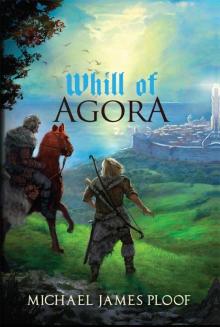 Whill of Agora woa-1
Whill of Agora woa-1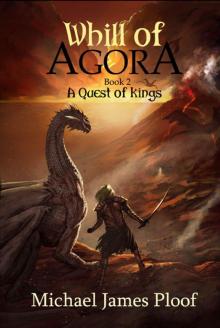 Whill of Agora: Book 02 - A Quest of Kings
Whill of Agora: Book 02 - A Quest of Kings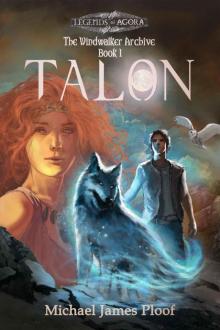 Talon: The Windwalker Archive (Book 1)
Talon: The Windwalker Archive (Book 1)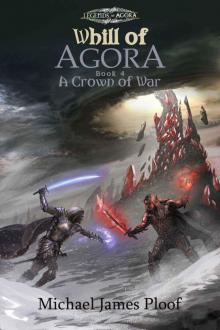 A Crown Of War (Book 4)
A Crown Of War (Book 4)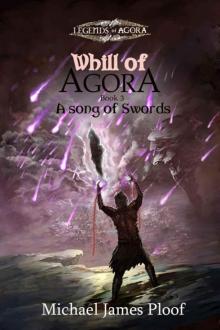 Whill of Agora: Book 03 - A Song of Swords
Whill of Agora: Book 03 - A Song of Swords